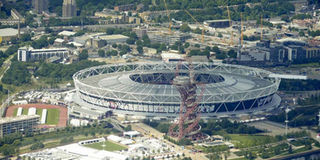London 2012 a mixed blessing for Olympic area's residents

This file photo taken on August 1, 2017 shows an aerial view of the London Stadium and ArcelorMittal Orbit at the Queen Elizabeth Olympic Park in Stratford, east London, on August 1, 2017. Five years on from the 2012 Olympics, the area of London where they were held has a new train station, a luxury shopping centre and vast green spaces. PHOTO | NIKLAS HALLE'N |
What you need to know:
- The Olympic Village, where athletes stayed during the competition, has been turned into thousands of flats.
- The LLDC plans for 10,000 new homes to be built in the area by 2030.
LONDON
Five years on from the 2012 Olympics, the area of London where they were held has a new train station, a luxury shopping centre and vast green spaces.
A swathe of post-industrial land in Stratford, east London, was given a new life but for local residents, the reality is a lot less perfect.
Penny Bernstock, an expert in housing and regeneration at the University of East London, said there were now "two worlds that co-exist" — the old, poor, Stratford and a new, wealthy one.
But Hugh Robertson, Britain's sports minister at the time of the Games, told AFP the legacy of 2012 is clear: "The area around Stratford has been completely transformed."
The aim for the London Legacy Development Corporation (LLDC) going into the Games was to regenerate the area — once deprived and blighted by high unemployment — by ensuring the infrastructure would have a life after the Olympics.
According to the LLDC, it's job done after billions of pounds were poured into the area.
The 2012 organisers were determined they would leave none of the white elephants that have littered host cities of past Olympics.
The Olympic stadium has been leased to Premier League football club West Ham for the next 99 years — and hosted the World Athletics Championships in August.
The futuristic Aquatics Centre designed by the late award-winning architect Zaha Hadid was scaled down after the Games and is now a popular facility for locals that can still host international events.
The Olympic Village, where athletes stayed during the competition, has been turned into thousands of flats.
"This is heaven! Look around you; look at this garden," Richard, a 29-year-old local resident, told AFP before making his way into the Olympic Park for his daily jog.
The LLDC plans for 10,000 new homes to be built in the area by 2030.
London seems to have avoided the fate endured by Athens — where the Games are synonymous with financial ruin — and Rio, where just over a year since the Olympics took place, the feel-good factor has vanished amid scandal and rotting venues.
In the Greek capital, little of the infrastructure has been reused, while in Rio, the Olympic Park is closed, the swimming pool has been drained and the Village, which was meant to be transformed into high-end housing, is still awaiting residents.
'AFFORDABLE FOR WHOM?'
Many Stratford locals though feel they have not benefited from the huge sums spent on the Olympics.
Regeneration has prompted house prices to soar, pushing many of its former residents out.
"When an area has been comprehensively regenerated, property prices will rise which, obviously, benefits anyone who owns a property," Robertson argued.
One result of rising prices has been homelessness.
Bernstock told AFP that homelessness in Newham — the borough where Stratford is located — increased by 51 percent between 2012 and 2015, compared to 32 percent for London as a whole.
Mary Ridley and her husband are part of that "new" Stratford.
The couple settled into the area two years ago, after eight years spent living in west London.
"We came here because it was a bargain! It's green, you have the Tube, shops, and it's very quiet," the 34-year-old told AFP.
"It was more affordable than where we used to live," she said.
But Bernstock asked: "Affordable for whom?"
"In 2012 Newham found only 12 percent earned more then £50,000 ($65,000, 55,000 euros, Sh6.5 million) per year, yet a two-bedroom affordable intermediate unit on the (Olympic) park costs £1,425 per month," she said.
"We should redefine what affordable housing is."
Organisers also put great emphasis on another Olympics legacy — the goal of making Britain fitter.
Robertson, the former sports minister, says at least 1.5 million more British people are taking part in sports than before the Games, although it is a figure that is impossible to verify.





